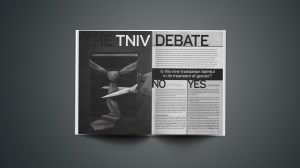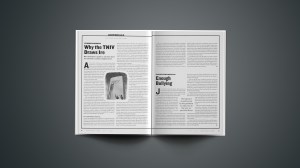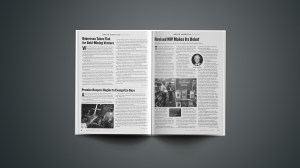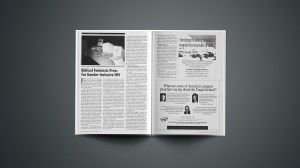In this series

Much of the negative press concerning Today's New International Version comes from a misunderstanding of Bible translation and a misrepresentation of the TNIV. Here are seven facts you should know.
- The goal of the TNIV is the same as that of the NIV (and other versions): to render the meaning of the original text accurately into contemporary English. Since no word or phrase in one language corresponds exactly to any word or phrase in another, a strict literal or word-for-word translation is impossible. Anyone learning a foreign language soon recognizes this. Translated literally, the Spanish phrase ¿Cómo se llama? comes out something like "How do you call yourself?" But in good idiomatic English it means "What is your name?" The words must be changed to capture the meaning in English. The daunting task for Bible translators is to find English words, phrases, and clauses that correspond as closely as possible to the meaning of the original text. Though this controversy has focused on gender, about 70 percent of the TNIV revisions are not related to gender but result from advances in biblical scholarship and the goal of greater clarity and precision. A word-for-word translation of Matthew 1:18 would read "she [Mary] was found having in womb from holy spirit." This literal rendering is impossible English, so the original NIV translated "she was found to be with child through the Holy Spirit." The TNIV improves this by translating "she was found to be pregnant through the Holy Spirit." Since no English speaker today would use the archaic "with child," the TNIV more accurately reflects the meaning of the original.
- In line with this goal of accuracy, the TNIV is intentionally gender accurate. When biblical authors refer to both men and women, the TNIV makes this clear. For example, the Greek word anthropos can mean "person" (its primary meaning) or "man" (a secondary sense), depending on the context. While the NIV translated Romans 3:28, "For we maintain that a man (anthropos) is justified by faith," the TNIV more accurately renders, "For we maintain that a person is justified by faith." Virtually everyone agrees that anthropos here means "person," so the TNIV translates it that way. The TNIV does not eliminate gender distinctions (as some critics claim) but rather clarifies them. References to females remain feminine. References to males remain masculine. But when the inspired authors are referring to both men and women, an inclusive term like person is used. This is just good translation policy—the kind of meaning-based translation practiced by Bible translators around the world.
- The TNIV utilizes contemporary English for today's readers. The English language is constantly changing, so Bible versions must be updated periodically. Words in the King James Version like artificer, discomfited, wotteth, and staves are no longer understandable, so translators substitute contemporary terms. While masculine generic terms like man, he, and brothers are still used today, empirical studies have shown that they are in serious decline and are increasingly perceived by readers as exclusive. If I announced to my church that "the brothers are meeting for breakfast tomorrow," I doubt most women would feel included. The statement is ambiguous at best. If we want Bible translations to be as clear and accurate as possible, then inclusive language should be used—when the meaning of the text is inclusive. You may ask, But why should we condescend to language changes produced by our heathen culture? While this may reflect a legitimate concern, history has demonstrated the impossibility of turning back the language clock. It would be a mistake for me to announce that I was "gay," even if I clarified that I meant happy. I may be protesting against language changes caused by homosexuals, but such protestations are irrelevant if my words are consistently misunderstood. Communication is most effective when we use today's language to express eternal truth.
- The gender-accurate language of the TNIV is nothing new. In the last 20 years, almost every English Bible produced or revised has used gender-accurate language. These include the New Revised Standard Version, the Good News Bible, The Message, the Contemporary English Version, and the New Living Translation among many others. Even versions that arose in opposition to inclusive language—like the English Standard Version—recognize these language changes and so utilize much inclusive language. In hundreds of passages the ESV revises the RSV with gender-inclusive language (see my article on the ESV's gender language at http://biblepacesetter.org/ bibletranslation/files/list.htm). Consider Matthew 5:11-12: RSV: "Blessed are you when men revile you … " ESV: "Blessed are you when others revile you … " The ESV is certainly far more gender inclusive than the NIV, which leads to the next point.
- Scholars on both sides of this debate recognize the legitimacy of many—even most—of the changes introduced in the TNIV. Though you could hardly tell this from the sensationalistic news coverage, opponents acknowledge that the TNIV often improves the accuracy of the NIV (see my article on TNIV improvements at http://biblepacesetter.org/bibletranslation/files/list.htm). We have already noted that anthropos usually means "person," not "man." The plural anthropoi usually means "people," not "men." For example, Matthew 12:36: NIV: "But I tell you that men will have to give account on the day of judgment." TNIV: "But I tell you that people will have to give account on the day of judgment." The Greek plural noun adelphoi often means "siblings" or "brothers and sisters." When used figuratively in the New Testament, it means "fellow believers" or "brothers and sisters" in Christ. For example, Philippians 3:1: NIV: "Finally, my brothers, rejoice in the Lord!" TNIV: "Further, my brothers and sisters, rejoice in the Lord!" Scholars agree that hundreds of generic terms translated "man" in the NIV are more accurately rendered in the TNIV. For example, John 13:35: NIV: "By this all men (Greek: pantes) will know that you are my disciples … " TNIV: "By this all people will know that you are my disciples … " Scholars agree that Greek pateres can mean "fathers," "parents," or "ancestors," depending on the context. When former generations are in view, pateres is best rendered either as "ancestors" (for both men and women) or "forefathers" (for male ancestors). For instance, Hebrews 3:9: NIV: "where your fathers tested and tried me … " TNIV: "where your ancestors tested and tried me … " Long before the TNIV debate, the King James Version recognized that Greek huioi often meant "children" rather than "sons." For example, in Matthew 5:9: KJV: "Blessed are the peacemakers: for they shall be called the children of God." NIV: " … for they will be called sons of God." TNIV: " … for they will be called children of God." These examples represent the tip of the iceberg. Scholars on both sides acknowledge that in hundreds of verses the TNIV improves the accuracy of the NIV. But what about the claims of "inaccuracies" and "distortions" of God's Word?
- Most claims of TNIV "distortions" are based on linguistic fallacies. Because of space constraints, I will respond to only two key objections made in a widely circulated petition produced by opponents of the TNIV. First, "The TNIV often changes masculine, third person, singular pronouns (he, his, and him) to plural gender-neutral pronouns." The example is Revelation 3:20: NIV: "If anyone (tis) hears my voice and opens the door, I will come in and eat with him (autos), and he(autos) with me." TNIV: "If anyone hears my voice and opens the door, I will come in and eat with them, and they with me." Opponents claim that them and they lose the sense of individual application and so distort the meaning. But the antecedent of the Greek pronoun (autos) is the inclusive indefinite pronoun "anyone" (tis), and so autos does not mean "him" (a male person), it means "him or her." Pronouns derive their meaning from the words they replace! The NIV is imprecise because it uses a masculine pronoun instead of a true generic. English does not have a non-gender-specific singular personal pronoun. Translators who wish to retain the singular can compromise by: (1) using he or she (most accurate, but awkward); (2) using the masculine pronoun he (see NIV), even though it is gender inaccurate (formally) and sounds exclusive to many readers; (3) using a plural pronoun (they) with a singular sense, which grammarians call the "singular they." This form, found in the TNIV, has been used in English for hundreds of years and is now widely accepted among grammarians. Few English speakers would say, "Everyone likes pizza, doesn't he?" Most would say, "Everyone likes pizza, don't they?" This is the same form used by the TNIV in Revelation 3:20. This point reveals a second error in the petition. It claims the TNIV here uses a plural pronoun, but in fact they is functioning as a singular pronoun (the singular anyone makes this clear). Opponents are confusing form with function. This form-versus-meaning fallacy is at the heart of the TNIV debate, and it surfaces again and again when opponents claim that the TNIV distorts the meaning by changing certain forms, such as singulars to plurals. An example they use is 1 John 5:12: NIV: "He who has the Son has life … " TNIV: "Those who have the Son have life … " Critics claim that the TNIV could be misconstrued as referring to groups. But no normal reader approaches English in such a wooden manner. If I said, "Those who pass this exam will pass the course," everyone would know I was speaking about individuals. The TNIV clearly means "those individuals," which accurately reflects the generic meaning of the Greek. Critics may counter that some meaning is still lost. But this is the nature of all translation, since no two languages are identical. Critics seem unwilling to acknowledge that words like he and man also lose some meaning by introducing male-oriented terms into generic contexts. Another objection in the petition claims, "The TNIV inserts English words into the text whose meaning does not appear in the original languages." The example is Luke 17:3: NIV: "If your brother sins" TNIV: "If any brother or sister sins" The petition complains that "the word sister is not found in the original language." But this is a misunderstanding of the nature of translation. None of these words occurs in the original language, because the original language is Greek! The right question to ask is What do the Greek words mean in context? In fact, the TNIV is more accurate. Opponents claim that the singular adelphos cannot mean "brother or sister," but this is simply wrong. Greek lexicons confirm that one sense of adelphos is a "fellow believer" (that is, "a brother or sister" in Christ) and numerous New Testament contexts illustrate this (see, for example, 1 John 2:9-11).
- The TNIV is not a "politically correct" version. Contrary to misleading media reports, the TNIV does not slant the Bible toward a feminist agenda. All members of the TNIV translation committee are evangelical scholars and most are complementarians, that is, conservatives on the role of women in the church. Their goal was not to produce a politically correct version, but to render God's Word accurately into contemporary English. To confirm this, readers need only consult TNIV passages related to male headship and the role of women. Consider 1 Timothy 2:11-12: NIV: "A woman should learn in quietness and full submission. I do not permit a woman to teach or to have authority over a man; she must be silent." TNIV: "A woman should learn in quietness and full submission. I do not permit a woman to teach or to have authority over a man; she must be quiet." If the TNIV were driven by a feminist agenda, it would surely have altered this and other disputed passages (see Eph. 5:22-23; Col. 3:18-19; and 1 Cor. 11:2-16, 14:33-38). When I point out these basic facts, the most common response is So what's all the fuss? If the TNIV follows standard translation policy, if gender distinctions are not blurred but clarified, if gender-inclusive language is commonplace in Bible translation, if every passage in the TNIV is exegetically defensible, if the translators were all leading evangelical scholars—then why so much controversy? The answer is certainly related to the heated debate over gender roles in the church—a debate that stirs strong emotions and divides evangelicals. We must beware, lest our theological convictions on this issue cloud our good judgment and shared values on the nature of Bible interpretation and translation. As we carefully study this issue together, let us reaffirm our unity in Christ and our common goal of accurately and clearly communicating God's Word to all people.
Vern S. Poythress argues the opposite and responds to Strauss.
Copyright © 2002 Christianity Today. Click for reprint information.
Related Elsewhere
Our TNIV Debate package also includes:
The TNIV DebateIs this new translation faithful in its treatment of gender?
Is the TNIV faithful in its treatment of gender? NoPolitical correctness puts pressure on translators to change details of meaning.
A Response to Vern PoythressThe TNIV preserves the original meaning.
A Response to Mark StraussThe TNIV undermines plenary inspiration.
See Mark Strauss' bio at the Bethel Seminary site.
For coverage of the TNIV debate, see these articles from Christianity Today:
Getting the TNIV Debate StraightOur policy against negative ads doesn't mean we're cutting off discussion. (June 7, 2002)
TNIV Critics Blast Scripture 'Distortions'But evangelical backers of new translation say gender changes are 'accurate.' (March 19, 2002)
Why the TNIV Draws IreNo translation is perfect, and each must be read with a careful exegetical eye. A Christianity Today editorial. (March 19, 2002)
Which Version Should We Use?What we said when the NIV was first published. A Christianity Today editorial. (March 19, 2002)
Christian History Corner: Translation WarsSharp as debate over the TNIV may be, the version's translators are getting off easy compared to John Wycliffe and William Tyndale. (March 1, 2002)
Weblog: The TNIV Battle ContinuesDobson and others launch "Kept the Faith" to accuse TNIV creators of violating their word and God's (Feb. 11, 2002)
Comparing the Three NIVsHow does the TNIV treat verses that were earlier criticized as theologically incorrect? (Jan. 31, 2002)
Weblog: Southern Baptist Leaders So Upset About TNIV That Denomination May Abandon NIV (Jan. 29, 2002)
Revised NIV Makes Its DebutTranslators alter 7 percent of the text to update style and gender issues. (Jan. 28, 2002)
The TNIV Web site offers the full New Testament text (in Adobe Acrobat format), a questions and answers section, endorsements, and other promotional material. Zondervan is also providing free copies of the translation.
Criticisms of the TNIV are available at KeptTheFaith.org and the Council on Biblical Manhood and Womanhood.
Michael W. Holmes, professor of biblical studies and early Christianity at Bethel College writes on the TNIV in the current issue of Books & Culture, a Christianity Today sister publication.
Christianity Today coverage of gender-inclusive Bible translation includes:
The Battle for the Inclusive BibleConflicts over "gender-neutral" versions are not really about translation issues. (Nov. 15, 1999)
Do Inclusive-Language Bibles Distort Scripture?He Said, They Said (October 27, 1997)
The Great Translation DebateThe divide over gender-inclusive Bibles hides what unites us. (Oct. 27, 1997)
Hands Off My NIV!Bible society cancels plans for 'gender-accurate' Bible after public outcry. (June 16, 1997)
Bible Translators Deny Gender AgendaFocus on the Family yanks children's Bible; NIV translator loses seminary job. (July 14, 19997)
Previous Christianity Today articles on Bible translation include:
A Translation Fit For a KingIn the beginning, the King James Version was an attempt to thwart liberty. In the end, it promoted liberty. (Oct. 22, 2001)
The Reluctant RomansAt Douai in Flanders, Catholic scholars translated the Bible into English as an alternative to the Bible of "the heretics." (Oct. 22, 2001)
We Really Do Need Another Bible TranslationAs good as many modern versions are, they often do not allow us to hear what the Holy Spirit actually said. (Oct. 19, 2001)
Old Wisdom for New TimesThe International Bible Society is doing "spiritual archaeology" and retro-publishing to reach seekers. (April 23, 2001)
And the Word Came with PicturesVisual Bible International (VBI), is producing a movie version of the Bible book for book, word for word. (March 1, 2001)
New Bible translations help to preserve world's disappearing languagesThe total number of languages in which the Bible is available in part or in its entirety now stands at 2,233. (Feb. 28, 2000)
What Bible Version Did Jesus Read?What does the knowledge that Jesus used different versions of Scripture mean for us today? (April 26, 1999)
On the Shoulders of King JamesBarclay M. Newman has kept before him a question posed by the translators of the 1611 King James Version: "What can be more [important] than to deliver God's book unto God's people in a tongue which they understand?" (Oct. 27, 1997)
Confessions of a Bible TranslatorAs a stylist on a new translation of the Bible, Daniel worries over the effectiveness of the language into which the text is translated. (Oct. 27, 1997)

















